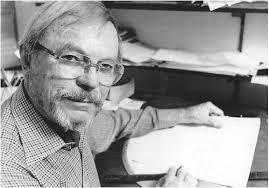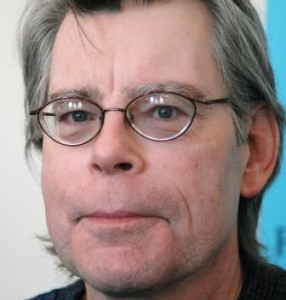(1) Today’s birthday boys:
Born 1866: H.G. Wells
Born 1912: Chuck Jones
Born 1947: Stephen King
Born 1950: Bill Murray
And as a bonus, also on This Day in History:
1937: J.R.R. Tolkien’s The Hobbit published
(2) Grotesque parody news story of the day: “Game of Thrones Cast Murdered Following Emmy Victory”.
FANS of popular HBO fantasy series Game Of Thrones were this morning trying to get over last night’s shocking post-Emmy massacre, where virtually the entire cast and creative team were brutally murdered in cold blood.
… “One minute Peter Dinklage was standing with his Emmy and a big smile on his face, the next minute his head went sailing through the air,” said one eyewitness to what is now being referred to as the ‘Red Emmys’.
“Maisie Williams and Sophie Turner were stabbed through the heart, and the big lad who plays Sam got it in the neck. Even by Game of Thrones standards, it was fairly over the top”.
With so many members of the cast and crew slaughtered, fans are now fearing that next year’s season will focus mainly on Bran Stark as there’s basically nobody left at this stage.
(3) Constructed languages are the topic of a forthcoming documentary, Conlanging: The Art of Crafting Tongues .
Featuring an overview of the history of constructed languages up to and through the amazing creations and initiatives of those who actively invent new tongues today, this film tells the rich story that has expanded far beyond Tolkien’s “secret vice.” It’s being made by the people who know the craft intimately for language lovers and a general audience alike.
https://player.vimeo.com/video/130812323?color=faa302&byline=0&portrait=0
And All Things Linguistic has an interview with the creators of the documentary in the Conlangery #112 podcast.
(4) Add this to the list of “Han Solo in Carbonite” products — a huge vinyl sticker for your door.
(5) This year Gen Con featured another official beer, Drink Up and Prosper, from Sun King Brewing. According to the Indianapolis Star, not only was the brew available at the con, but it was put in cans and sold in stores.
This will be the fourth year the brewery has partnered with the world’s largest gaming convention, and the fourth beer brewed specifically for the event….
Previous beers included Froth of Khan (2014), Flagon Slayer (2013) and Ale of Destiny (2012).
(6) The Pittsburgh Pirates major league baseball team recently dressed up as superheroes “in the greatest baseball-themed comic book crossover of all-time.”
After the Pirates defeated the Dodgers, 4-3, the team dressed up as superheroes before boarding their flight to Colorado — like, for example, Superman with an expert hair curl hanging out with Bane that came complete with appropriate Zack Snyder lighting.
A squadron of Marvel’s cinematic heroes hung out with either a Na’vi or a really off-brand Nightcrawler: …
Costume selfie! (Via @El_Coffee on IG) pic.twitter.com/06VfkxqmZ1
— Pittsburgh Pirates (@Pirates) September 21, 2015
(7) The Tor boycott continues to fade to invisibility as a news story. Here’s what I found searching Twitter for “Tor boycott” today.
PLEASE BOYCOTT THE #BBC TONIGHT. THEY WILL BE SHOWING A PROGRAMME AT 7.40PM (BST) GLORIFYING TERRORISM. THE DOC-TOR MUST BE EXTERMINATED!
— Ginger Dalek (@Ginger_Dalek) September 19, 2015
It was the hyphenated “Doc-Tor” that triggered the result.
(8) And by strange coincidence, Adam-Troy Castro has written some good advice in his new blog post, “Writers: The Long-Term Benefits of Not Being An Ass”.
For the vast majority of artists, being an asshole to the people who give you money is not a good career move. You are not indispensable unless you’re an eminence of such towering fame that they are willing to bend heaven and Earth to keep you. And sometimes not even then. Fame is fleeting.
So one guy I’m thinking of, who has come out and described himself as one of the greatest writers of his generation, who says that his work is reeking with literary virtues that any number of others would give their left tits to be even shelved next to, who has been abusing his publisher in public and attacking his editors as people and in general making himself a horse pill – I think he’s in for a surprise, sooner or later, probably sooner. Writers who can sell the number of copies he sells, or more, are not exactly thin on the ground, and the vast majority of them will not be rallying their readers to send hate mail.
But this is not about him. This is about you, the struggling artist. And to you I have some strong advice.
Be a sweetheart.
Be the kind of artist who, when dropping by the publishing house, brings cookies. Or if not cookies, then at least a warm smile and a gracious manner.
(9) The Clarion Foundation has received a $100,000 donation from a benefactor who wishes to remain anonymous. Clarion will use the donation to launch an endowment fund in support of the Clarion Science Fiction and Fantasy Writers’ Workshop, held annually at UC San Diego.
Karen Joy Fowler, president of the Clarion Foundation, expressed profound appreciation for this generous gift. “This is tremendously important to all of us who have worked with, for, and on behalf of Clarion over the years. For us, the workshop is a labor of love. Having these funds in hand allows us to plan for the future in a way we’ve never been able to before. This gift provides a solid foundation on which we can build.”
“Our global civilization is now embarked on an unconstrained experiment in long-term sustainability, which we have to get right for the sake of the generations to come,” says Clarion Foundation Vice President Kim Stanley Robinson. “Science fiction stories, ranging from utopian to dystopian, are what we do now to imagine outcomes that help us evaluate our present practices. The Clarion workshop nurtures and trains writers to change the ways we think about the future, and it helps to connect the sciences and the arts at UC San Diego and around the world. We’re thrilled with this gift, which enables us to continue that crucial work.”
The Clarion Foundation partners with UCSD in the delivery of the workshop, with the foundation managing faculty selection and the admissions process and UCSD managing the six-week summer workshop. The foundation has annually conducted fundraising campaigns that allow it to provide about $12,000 in scholarships each year and to cover expenses.
(10) Aaron French compares horror traditions in “Past and Future: Esoteric and Exoteric Philosophy in Weird Fiction” on Nameless Digest.
As with everything else, the philosophy behind dark, weird, and horrific fiction has evolved over time. This philosophical evolution of horror fiction arguably began in earnest with Edgar Allan Poe – though Poe also nurtured a sense of romantic love, which conquers, as well as defeats, his harshest poetry, e.g. “Alone.” Bleaker still, and more callous in disregard of the human race, is H. P. Lovecraft, grandfather of the grim, who described his philosophical position as the following: “…by nature a skeptic and analyst… [I] settled early into my present general attitude of cynical materialism.”
….But if we turn our attention to the postmodern, a new speciation occurs in the writings of Thomas Ligotti, representing a philosophy so hopeless, malicious, and unorthodox that it gives readers pause, unintentionally flipping mental levers and bringing about unwelcome psychological changes.
(11) Here’s somebody else who has definitely flipped his mental levers — “Man angers neighbors by shining ‘alien’ fighting spotlights”:
Neighbors in the Virginia Road area of Hermitage said Arthur Brown, 78, shines the spotlights outside his foil-wrapped house at all hours of the day and night because he is afraid of extra-terrestrial attacks.
(12) From June of 1992, a YouTube clip from Arsenio Hall with guests William Shatner and Leonard Nimoy, who are too funny. Shatner enters using a walker and a nurse pushes Nimoy in a wheelchair.
James H. Burns further comments:
Shatner and Nimoy even pitch their convention appearances at the Creation cons of my old pals, Gary Bermand and Adam Malin–
And most amazingly, Shatner talks about his hopes for Star Trek Seven, which he later helped turn into a pretty good Trek novel!
[Thanks to James H. Burns, Will R., Martin Morse Wooster, and John King Tarpinian for some of these stories. Title credit belongs to File 770 contributing editor of the day Rose Embolism.]
Discover more from File 770
Subscribe to get the latest posts to your email.







I’ve been reading thru comments pretty quickly, so apologies if this has already been mentioned:
Charlotte MacLeod also wrote two fairly cozy mystery series under the name Alisa Craig. Here’s what an article on Maine Crime Writers says about them:
From the pre-1960’s, Craig Rice was known for her “screwball mysteries”, many featuring lawyer John J. Malone. (Interestingly, this article at Thrilling Detective cites Crime On My Hands, purportedly written by actor George Sanders, as being a collaboration between Rice and SF writer Cleve Cartmill, of “Deadline” fame.)
In my reading, it wasn’t just tears, and they weren’t shed for Julia. It was a struggle for control of his mind right up to the end. “Chestnut tree” was fluff from the 40s – jingoistic, feel-good nonsense that got airplay at the height of the wartime propaganda, as Orwell’s first generation of readers knew. The hero Rutherford cried when he heard it because he knew his noble revolution had been perverted beyond all hope. Winston actually just heard propaganda claiming that they had always been at war, now no longer with Eastasia, but Eurasia, and so he drew 2+2=5 in the dust, then hallucinated the song, complete with misremembered lyrics, while:
We know that Ingsoc and Big Brother collapsed. Winston did not fight in vain. By going so far over the top in the final paragraphs – “a vast seaborne armada had secretly assembled… — victory — greatest victory in human history — victory, victory, victory!” – I felt Orwell was all but saying that the collapse had already begun and that Winston, though too far gone to realize it consciously, knew it on some level. But in any case, moral victory was achieved thanks to other Smiths. Orwell leaves us to wonder if it finally came too late to save Winston.
That’s pure Human Wave.
I don’t know if I think Sarah Hoyt’s writing advice warrants a manifesto, but I didn’t find it that hard to wrap my head around. It certainly wasn’t very prescriptive:
I guess her sharpest criticism was:
Are you asking, do the Ancillary books commit “grey goo”? I can just speak from my experience, which is that AJ got off to a pretty rocky start, so it took me a while to get around to finishing it, but I enjoyed it when I did, so no, not really grey goo. On the other hand, so far I haven’t seen enough to hold my interest for a whole trilogy.
Dear Cally, I wish to order a half dozen of your premium forehead cloths, delivery IMMEDIATELY.
1.(one cloth sizzles and desiccates)
Night Watch, Terry Pratchett
2. (one then two cloths dry almost immediately and start to char)
Paladin of Souls, Lois McMaster Bujold
3. (another cloth rendered useless)
The Goblin Emperor, Katherine Addison
4. (the last two cloths are consumed almost instantly by the searing heat of the tormented forehead)
Jonathan Strange and Mr. Norrell, Susanna Clarke
I will be going outside into the cool air and may be some time.
1. EIGHT MILLION STORIES IN THE NAKED CITY
Perdido Street Station, China Mieville
Night Watch, Terry Pratchett
2. THE SWORDSWOMAN AND THE PALADIN
The Privilege of the Sword, Ellen Kushner
Paladin of Souls, Lois McMaster Bujold
3. MOVING HOUSE
The Goblin Emperor, Katherine Addison
Coraline, Neil Gaiman
4. STORIES OF HISTORICAL FACT
Tooth and Claw, Jo Walton
Jonathan Strange and Mr. Norrell, Susanna Clarke
*dives into mountain of forehead cloths*
@Brian Z. I guess I need to re-read it, because my take was always that the wars were a sham as well, like everything else. I’m embarrassed to say that if Big Brother collapsed, I never realized it. I have walked away multiple times thinking Winston never had a chance.
But it’s a rich vein, I think, in part because Orwell knew Smith couldn’t lack every trapping of a “hero.” A crushing grind where no one developed would have been an even more boring story than what he realized. But I never liked Winston that I can recall, and I never felt there was any nobility to his struggle. If anything, the pettiness of his quests makes him all the more pathetic. And in the end, Big Brother knew all along; Big Brother expects such things as part of the process and manages them pretty effectively.
I guess I can see how he technically could fit Hoyt’s bill (he fights until he doesn’t fight anymore), but he’s just not the spirit I’m taking from her urgings not to make her want to swallow stoats. Still, you’ve made me want to read it again to see if I could see that interpretation.
My point about AJ is that it’s at least as much a story of a person resisting dehumanization as 1984 is. In fact, one could say Breq is somewhat more efficacious and resists even greater forces for love (agape, at least). To me, it’s almost the only “message” of the book. So if 1984 is Human Wave, why wouldn’t AJ be?
@Brian Z. Well, I have learned something today. Or relearned. I can’t believe I never read the appendix, but it’s there. Big Brother falls eventually:
http://qz.com/95696/you-probably-didnt-read-the-most-telling-part-of-orwells-1984-the-appendix/
But even there, it’s not the struggles of the Smiths that do it–it’s language itself, apparently. Deus ex Lexica.
To put all this another way, I always thought the full horror of Smith’s story is that there’s no point at all to it. Again, I would say: what would a non-Human Wave version of 1984 have looked like?
@Lydy D. Nickerson, tell me about Bold as Love? (I hope you see this question, at the end of an old thread…)
Good golly, Hoyt completely misunderstands what “grey goo” is, doesn’t she? Warning: Link to TV Tropes. You have been warned; don’t blame me if you lose an hour or three…
Anyway, <rant>Grey Goo, (or Gray Goo in the American spelling), is a well-known SFnal phrase, and it’s nothing at all like what Hoyt uses it to describe. If she wants to create a meme, she should start with a new phrase, not try to hijack an established one. </rant>
It’s one (but only one) of the reason that Hoytian diatribes are so hard to follow. Words mean what she wants them to mean and any lingering dictionary definitions are your fault.
@cassy B
You mean like Brad Torgersen “inventing” the derogatory term CHORF, apparently unaware if its previous and differing usage? 🙂
(marking this spot)
So if 1984 is Human Wave, why wouldn’t AJ be?
Because the proponents of “Human Wave” know that 1984 is regarded as too great a work to exclude with their silly “movement”, and thus must come up with pretzel logic explanations as to why it fits. Ancillary Justice, on the other hand, has feminist cooties on it, and isn’t yet part of the “canon” of science fiction, so it can be safely cast out.
What, what’s it doing?
What wouldn’t be Human Wave in Hoyt’s formulation? Clicking through to her post she says inspired the manifesto, many of the allusions were to European intellectuals, so maybe Sartre’s Nausea or No Exit? Celine or something like that? Some of those definitely meander, they are largely hopeless and/or absurd, focus on language, feature antiheroes, aren’t “fun” in many ways. But I can’t think of a lot of sci-fi that fits that.
Because “literature” is more likely to contain such things, I guess it helps me understand why literariness is seen as a bad thing for sci-fi. But even still, I just can’t see a plague of literary sci-fi upon the world at the moment.
Hoyt should also get credit for saying such things are “allowed” rather than required (though she includes a few “shoulds” in there). I agree there’s nothing wrong with entertainment. Being even clearer about that, on all sides–this is what I like, not what is right and what everyone is required to do–would help all the way around.
At the same time, I’m now thinking I could make a case that the follow-ups to Ender’s Game were all apologies for the “Human Wave” of the first book. Discuss!
Will R: Presumably non-Human Wave novels overlap strongly with novels that Jay Maynard thinks aren’t about telling an exciting story well. Anything by Ann Leckie, anything by John Scalzi at least since Fuzzy Nation, anything by Cat Valente…all the usual suspects. Conversely, plotless, pointless, dull, unadventurous, rambling theological parables are In! In! In!, as long as they’re done by the right people.
Quick question here: is it *Hoyt* who says 1984 would count as Human Wave? Or is this merely Brian Z.’s contention? If the former, yes, it’s hard to imagine how she wouldn’t also count Ancillary Justice. If the latter, consider the source; Hoyt has enough logical burdens of her own to bear–it’s not fair to allow Brian Z to add to that load.
I’m SO not a fan of Sarah Hoyt’s, or of her relationship to my country (or to reality, for that matter). But, please, let’s not do this. It’s her name, she gets to say what she wants to be called.
But, please, let’s not do this. It’s her name, she gets to say what she wants to be called.
I’m pretty sure the asterisks were for emphasis, not to claim Hoyt wasn’t her name.
@Cat It’s only Brian as far as I know, but his take on it is interesting. It does make me wonder what Hoyt would think. I’m with most of the people here in wondering how Human Wave wouldn’t rule out big swathes of pretty well-accepted SF/F.
Agreed about Cat’s use of the typography. Well-accepted means of making things bold in bb markdown.
Aaron:
Oh. They came out as quotes in my browser, for no good reason. (I’ve refreshed the page, and I see asterisks now?!) That, coupled with some complaining in one of the threads I whizzed past this weekend about her name-change, and I assumed that was what the quotes were about.
Cat: I’m sorry to have jumped the gun.
Aaron: I’m pretty sure the asterisks were for emphasis, not to claim Hoyt wasn’t her name.
Yes — or you can surround text with
<strong>text to be bolded</strong>
to get bold in WordPress.
Really, this mostly started as my way of saying this Scroll made me want to read Ligotti.
@ Cassy B: Bold as Love is not quite like anything I’ve ever read. It starts out with the premise that the obvious solution to dissolving the United Kingdom and avoiding wholesale social catastrophe is to have a bunch of rock concerts. Along the way, it retells the Arthur legend, blends magic and technology, and does an amazing number of abrupt twists and turns. There’s social breakdown, economic disaster, ecological disaster. What one does with accumulating shit, literal and metaphorical, run through the books.
I did a lot of primary reading about the counterculture in the sixtes, many years ago. One of the things that kept on coming up was the idea that somehow, music would change the world, save the world. And it seemed very weird to me, reading in the eighties. I kept on thinking, “How did you think that was going to work?” (I mean, it hadn’t worked, Ronald Reagan was president when I was doing this reading, but I always wondered what they were on about.) Bold as Love plays with that. In addition to the music, it takes magic and technology and zen and charisma and sex and money and an absolutely huge amount of infrastructure. I love infrastructure.
There’s an unusually broad range of human behavior on display. There’s unthinkable brutality and everyday human kindness and acts of vast generosity and altruism and petty politics and grand scheming. People’s lives intertwine in complicated ways, and the people themselves are different in different contexts, while remaining themselves. You get to see people like Fiorinda and Axe and Sage in small, private moments, on stage as part of a spectacle, complicated romantic moments, moments of shock, moments of joy. And they present themselves differently, just as real people do. The ways that the personal and the professional and the political are braided are wonderful.
It’s a poly love story, and that totally trips my triggers. The ways in which they sabotage each other, love each other, make huge mistakes, and recover from those mistakes are all very reminiscent of my own real-life experiences. It’s not often that I see a poly relationship well-portrayed. They tend to be either too fraught or too obvious and easy. This is neither.
It’s a book about context. About consequences. About drug, set, and setting. It treats the intangible and unknowable in unusually useful ways. It deal with religion and the experience of the numinous in several complicated ways that are, again, unlike what I’m used to seeing, at least in genre.
Jones is also doing something I’m not really sure about. The structure is a bit odd, and I think she’s putting her reveals in odd places. It’s almost as if she’s back-shadowing rather than foreshadowing; the reveal happens, and then its significance and resonance are built in afterwards. This could be a mark of a badly written book, but I think that it’s not. I think that it’s more like how we actually experience life, where transformative events happen, and then we learn what they meant. In some cases, we learn all our lives long how what these events mean to us. (Some of us require therapy to do this work.) Someone better at lit crit that I am can maybe speak to this aspect. I do think that this is one of the reasons why the book can be hard to get into.
Aaron on September 23, 2015 at 5:39 am said:
That’s my assumption, too. Puppy arguments for why SF classics are excluded from whatever they’re complaining about read, to me, exactly like lit snob arguments for why classic-classics are excluded from whatever genre or populist quality they’re complaining about. It’s a quick bit of plaster over a nail-hole of cognitive dissonance.
The real problem with the would-be “human wave” movement is that in order for any artistic movement to really become a thing, some great — or at least popular — works have to be produced within it. The works are what drive the movement. The “human wave” or “superversive” stuff always feel like they want to try to start the movement first. You know, issue a manifesto, and there it is. But unless that manifesto inspires at least a handful of key works, it’s never going anywhere.
Winston loses at the end of 1984. That’s what the whole book is about. And it’s meant to be horrifying. It’s an indictment of the society depicted in the book. Orwell was a social realist, like George Bernard Shaw, and one of their recurring themes is the way people are inescapably products of their circumstance. Winston has been brainwashed. Brainwashing is a thing. It’s real. It works. Cults depend on it. If the liberators showed up right at the end of the book to throw down Big Brother, Winston would fight them as hard as anyone. Then he would have to be deprogrammed.
Orwell seemed to know all that, which is really interesting, because I don’t think knowledge of how brainwashing and cults work was at all widespread in 1948.
“I don’t think knowledge of how brainwashing and cults work was at all widespread in 1948.”
Sounds like between being a foreign policeman in India and then fighting in the Spanish Civil War and seeing propaganda from multiple angles, he got quite a taste of the “modern” in that regard.
21ST CENTURY FANTASY, ROUND FOUR
2. THE SWORDSWOMAN AND THE PALADIN
The Privilege of the Sword, Ellen Kushner
3. MOVING HOUSE
The Goblin Emperor, Katherine Addison
4. STORIES OF HISTORICAL FACT
Jonathan Strange and Mr. Norrell, Susanna Clarke
@Lydy Nickerson, thanks; your review puts Bold As Love solidly near the top/middle of my TBR stack. I’ll see if my library has it/can get it. (Still trying to get 2015 Hugo reading done. Is this a 2015 book? That’ll move it higher…)
I didn’t realize Orwell was actually involved in producing propaganda for a time.
http://maddy06.blogspot.co.uk/2008/12/george-orwell-india.html
@ Cassy B.: Nope, not a 2015 book. And, alas, your library is unlikely to have it. I was only able to find them as ebooks. I think the first one, Bold as Love was published in the US, but I don’t think the rest have been. (There were five when I read them, all Jimi Hendrix song titles, and there’s a sixth, now that I haven’t read because busy, dammit.)
1. EIGHT MILLION STORIES IN THE NAKED CITY
Night Watch, Terry Pratchett
2. THE SWORDSWOMAN AND THE PALADIN
The Privilege of the Sword, Ellen Kushner
Paladin of Souls, Lois McMaster Bujold
AIIIEEEEE!!!! Paladin of Souls.
3. MOVING HOUSE
The Goblin Emperor, Katherine Addison
4. STORIES OF HISTORICAL FACT
Tooth and Claw, Jo Walton
Will R: A few notes, then, about Ligotti!
The first thing to know, going in, is that he’s a real, for-true nihilist. He started off with profound pessimism and has moved to outright argument (in the book-length essay The Conspiracy Against The Human Race) that nonexistence is always the better outcome for any creatures like us. I keep being a little surprised he hasn’t committed suicide, and I don’t say that flippantly at all.
His earliest stories are very much directly Lovecraftian. He evolved from there into a distinct vein of Lovecraft-influenced but not Lovecraft-imitating stories, and then into a harder-edged mix that includes a strong influence from Jim Thompson, James Elroy (early prose style), and the like.
Let’s see, stories of particular note:
“Nethescurial” and “The Last Feast of Harlequin” helped make his mark. They take Lovecraftian narrative and narrators, and yoink them into strange new realms. “Nethescurial” does drastic things to the “I’m writing a letter” format, and “Last Feast” picks up the academic-in-dangerous-territory motif and likewise hauls it off to meet unsuspsected kinfolk.
“Professor Nobody’s Little Lectures on Supernatural Horror” and “Notes on the Writing of Horror: A Story” first show off Ligotti’s flavor for genuine humor in horror. The lectures pose all kinds of fun questions about who this professor is, and who the audience is. “Notes” is like Worst. Shaggy dog story. Ever.
I have a special fondness for the Teattro Grotesco stories, all touching on the basic theme of an anti-art pushing and pulling on the mental balancing act that lets us survive in the world without being flooded by it. “Teattro Grotesco”, “Gas Station Carnivals”, “The Bungalow House”, and several others are all stories about modern artists, or modern appreciators of art, and how a true understanding the world and ourselves destroys the possibility of art.
The Agonizing Resurrection Of Victor Frankenstein And Other Gothic Tales might be his masterpiece, and it’s available now in a good cheap-ish e-book. It’s a collection of vignettes that are at once hilarious and horrific, building on the history of horror to new ends.
He’s also a talented musician. You’ll find the songs of his EP The Unholy City on Youtube, along with this by Current 93, for which he did the text:
I Have a Special Plan For This World
(That’s 22 minutes of, um, something. Narrative, sound effects…it’s almost a little radio play.)
@Bruce Thanks for the primer! Looking forward to checking it out.
21ST CENTURY FANTASY, ROUND FOUR
1. EIGHT MILLION STORIES IN THE NAKED CITY
Perdido Street Station, China Mieville
Night Watch, Terry Pratchett
Oh Crap. I absolutely detested PSS, but honestly, it’s the stronger book.as far as descriptive prose and setting. And Night Watch really needs context as part of a group of novels where we’ve seen the characters develop.
But hell, Night Watch is far less annoying in displaying its allegiances. So, Pratchett.
2. THE SWORDSWOMAN AND THE PALADIN
The Privilege of the Sword, Ellen Kushner
Paladin of Souls, Lois McMaster Bujold
As part of the Chalion sequence, Paladin of Souls is even stronger to my mind than Curse of Chalion. I live the themes and characters it works with.
3. MOVING HOUSE
The Goblin Emperor, Katherine Addison
Coraline, Neil Gaiman
If it were any other book but Goblin Emperor, this world be easy. But a fantasy world which isn’t about ruthlessly disposing of enemies? Yeah.
4. STORIES OF HISTORICAL FACT
Tooth and Claw, Jo Walton
Jonathan Strange and Mr. Norrell, Susanna Clarke
Will R.: During WW2 George Orwell worked in the Ministry of Information, run by Brendan Bracken, which is accounted the reason for the name Big Brother whose initials are BB.
@Mike Very cool–thanks. So many interesting things at every turn…better go find a good biography.
> “I don’t think knowledge of how brainwashing and cults work was at all widespread in 1948.”
I’d say that keen observers of human nature have often managed to depict aspects of it before they’re formally analyzed.
21ST CENTURY FANTASY, ROUND FOUR
1. EIGHT MILLION STORIES IN THE NAKED CITY
Nope. Nopenopenope. With tears in my eyes, I must abstain.
3. MOVING HOUSE
The Goblin Emperor, Katherine Addison
I agree with a previous poster that both are good, but TGE is new.
Yep, I can read any Vorkosigan books, goor or bad, but I bounced off the Chalion badly. I don’t think the Vorkosigan books are genre shaping, but they are very entertaining.
Regarding brainwashing, Shakespeare depicted it in “The Taming of the Shrew”.
I pointed this out to a Shakespeare professor. She was Not Happy with me. (She considered the play romantic, of all things…)
Pulling the plaster off quickly means it hurts less, right?
1. Perdido Street Station, China Mieville
3. The Goblin Emperor, Katherine Addison
4. Tooth and Claw, Jo Walton
Taming of the shrew is not romantic.
Tasha Turner, yes, I made that very clear in my ten page term paper. I itemized the brainwashing techniques, with comparable examples from religious cults (a big thing back then; everyone was worried about the Moonies) and Viet Cong prisoner-of-war tortures.
She wrote agonized negations in red ink in the margins, but I’ll give her credit; she gave me an A on the paper, despite profoundly disagreeing with its premise. (Now I rather wish I’d saved that paper. I’d like to re-read her protestations….)
In college, I did a paper on Hamlet, arguing that Hamlet was emotionally unbalanced, and Claudius was Not The Bad Guy. I was detailed and specific, and the professor didn’t agree, but she loved it, and bragged on it to the rest of the department.
I was always pleased by that. 🙂
My mother was a theatre director and college professor, and every spring the department would put on a Shakespeare comedy. One year it was her turn to direct, and during the meeting to select the plays for the semester the chair suggested doing Shrew. “Great!” said Mom. “I’ve been wanting to do Shrew for a while now. The thing is, I’m going to do it as an absolutely straight look at domestic violence.”
Crickets.
“So!” said the chair. “Two Gents? Or Errors?”
Lexica, heh. Nice to know that there are others who share my opinion. (I’ve always hated that play.)
True Story: For a long time I put off reading the Vorkosigan books despite recommendations from a trusted friend. Because of the Baen covers.
Soon Lee –
I have seen it said in other places that Robert Charles McMaster failed to invite the Cover Fairy to his daughter’s cristening. Hence her terrible cover luck.
Though the NESFA Press cover of Barrayar is really good.
She is in the process of having an artist re-draw covers for all the Vorkosigan e-books where she has her own rights. Pictures on her Goodreads blog. Falling Free and Ethan of Athos are there so far. I like Falling Free. I think Ellie’s rifle could be more futuristic on Ethan of Athos (it also makes me think of a Modesty Blaise cover, where Willie has somehow acquired a baby).
Hmm. Several of the objections I have to describing 50 Shades of Grey as a love story apply equally to describing Taming of the Shrew as a love story.
Cassy, that sounds like a fantastic paper.
Since we are sharing opinions on Bujold’s novels…
I loved the Vorkosigan books as soon as I was introduced to them by that $1.99 Borders of Infinity collection.* The Warrior’s Apprentice and Falling Free are me least favorite of the Vorkosiverse novels. I love the Chalion novels even more, but never could get excited about The Sharing Knife series and gave up after book 3.
*I assume that whole group of $1.99 paperbacks were loss leaders for various authors. Worked like a charm on me!